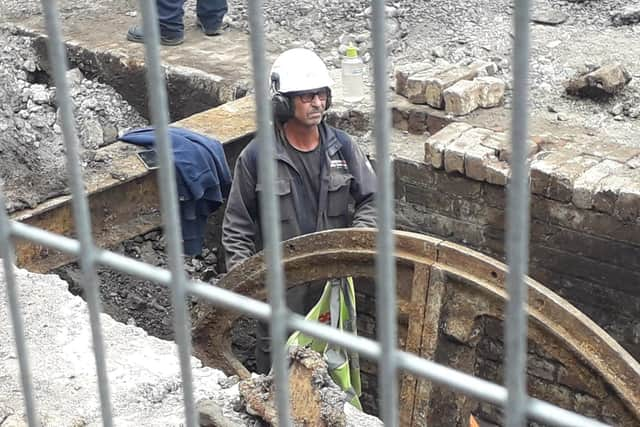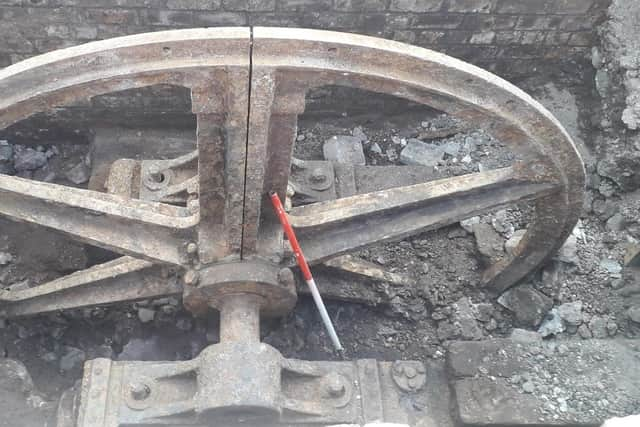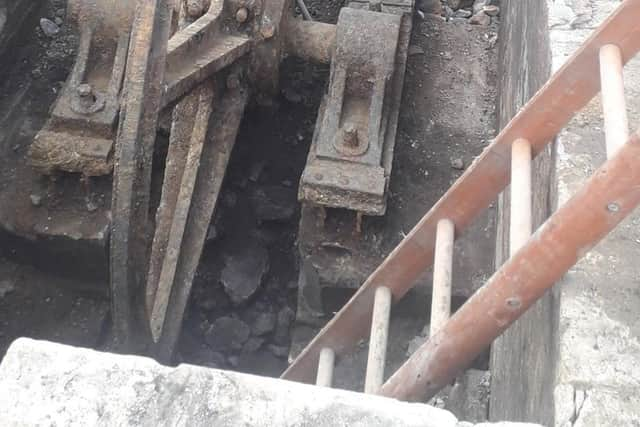Edinburgh tram cable wheel unearthed nearly 100 years after last used
It is believed to date from around 1899, when the city’s original horse-drawn tram system was switched to being powered by cables running under the rails to pull the trams along.
The find on Leith Walk near its junction with Pilrig Street is believed to be close to the so-called “Pilrig muddle” where passengers were forced to change from Edinburgh’s trams to the-then separate burgh of Leith’s separate system, which was electrified in 1905.
Advertisement
Hide AdAdvertisement
Hide AdThe wheel, which was uncovered in the past few days, is thought to have been decommissioned when the city’s trams were electrified in 1922, two years after Leith became part of Edinburgh.
City archaeologist John Lawson told The Scotsman: “This is a very important and interesting discovery.
"It is part of the original cable-winding mechanism.”
Mr Lawson said experts from Guard Archaeology would be investigating and recording the find over the next week.
He said: “We will then try to remove it for safekeeping.”


However, no decision has taken about whether it will put on public display.
Tram fan ACamerumer, who posted pictures of the find on Twitter, said: “I'm hoping that they could be dug up, rebuilt and put somewhere along the route, or reinforced glass put on top so people could look down and see some historical engineering.”
Paul Tetlaw, a rail expert at sustainable transport campaign body Transform Scotland, said: “It’s a wonderful find, so let’s hope it can be preserved as part of future tram works.”


A similar wheel was discovered during non-tram excavation work around ten years ago at nearby Shrubhill, but was left in place and re-covered.
Tram fan Andy Arthur said the cables were powered by a series of stationary steam engines, including at Shrubhill, which ran at a constant 12mph, which governed the speed of the tram “cars” other than when they disengaged from the pulleys to stop.
Advertisement
Hide AdAdvertisement
Hide AdLeith Walk was part of Edinburgh’s first tram route, which opened in 1871 between Leith and Haymarket.
It was also part of the last line to operate when the system was closed in 1956.


The existing Edinburgh Airport to York Place line was opened in 2014.
Work on the three-mile extension north east to Newhaven started in 2019 and is due to be completed in spring 2023.
Edinburgh City Council, which is in charge of the project, said a shortage of concrete and other building materials is not expected to extend that date.
Council transport convener Lesley Macinnes said: “The Trams to Newhaven project has uncovered numerous pieces that give a fascinating insight into Leith’s long and colourful history and this tram wheel is no exception.
"Its location is significant and will help us better understand how the Edinburgh and Leith tram systems interacted with each other all those years ago.
"Leith continues to live up to its reputation as being one of the most important urban archaeology sites in Scotland.’
A message from the Editor:
Thank you for reading this article.
We're more reliant on your support than ever as the shift in consumer habits brought about by coronavirus impacts our advertisers.
If you haven't already, please consider supporting our trusted, fact-checked journalism by taking out a digital subscription.
Comments
Want to join the conversation? Please or to comment on this article.
